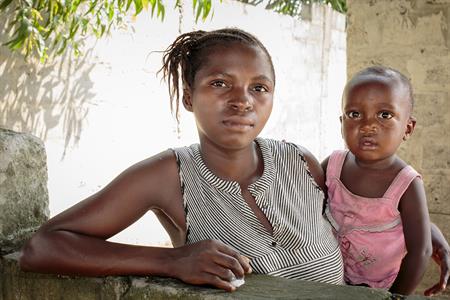Labour Pains
News

We share this piece as the International Confederation of Midwives meet this week in Toronto, Canada. Rebecca Boyce is Cuso International’s Global Lead for Gender Equality and Social Inclusion.

Does maternal mortality and morbidity overshadow the problem of violence against pregnant women during labour and delivery?
The Cuso International and Canadian Association of Midwives (CAM) joint project Midwives Save Lives (MSL) held a workshop on Gender Equality and Social Inclusion in the context of Respectful Maternity Care (RMC) where four partner Midwifery Associations from Ethiopia, Tanzania, Democratic Republic of Congo (DRC) and Benin discussed this question as it relates to access to quality sexual and reproductive health care and rights.
I became pregnant in DRC while working on development/humanitarian issues related to gender equality and sexual and reproductive health and rights. As such I was very aware of the WHO statistics on maternal mortality. 99% of all maternal deaths occur in developing countries and the DRC still has a lot of work to do in this regard. I was of course very apprehensive about actually giving birth in that context. As a privileged outsider I had the option not to but was amazed to learn about the lengths to which my Congolese colleagues and friends would go to travel outside of the country to give birth. Attending some of my pre-natal visits was also an eye-opener, the doctor explained to me that typically women do not see any health care provider prior to 5 months of pregnancy and many cannot afford the hospital bills associated with labour. He also said that midwives were not well regarded.
This did not fit with my idea of pregnancy and birthing. I eventually chose to leave the country and was lucky enough to have a home birth with skilled midwives in Canada. The MSL project has made me realise that a more compelling reason for me to seek skilled midwifery care elsewhere is violence or the threat of violence against pregnant women. This lesser known reality causes many women to lose the ability to control their own sexual and reproductive health.
The midwives attending the MSL workshop agreed that while many pregnant women associate childbirth in maternity units with comfort and care, for others attending public healthcare centres this experience is not always pleasant. They gave firsthand testimonies of how doctors, nurses and midwives without training in RMC or who are simply overwhelmed with stress mistreat pregnant women. Several research studies in Africa have documented women’s reports of clinical neglect, monetary demands or discriminatory treatment, verbal and psychological abuse, including beatings by health workers and denial of traditional practices.
To be sure this problem is not unique to DRC but Thethe Lukusa, a midwife and a professor based in Kinshasa, says that :
“The frequency of violence against pregnant women during labor or delivery is worrisome and is also one of the factors contributing to increased stress in pregnant women.
“In the DRC, midwives trained before the reform of the midwifery training program in the DRC in 2013, did not have the RMC approach; it was not yet integrated into daily practice, nor in their training curricula.
“Trained midwives are involved in major decisions about MNCH practices, but these decisions are often not made in collaboration with the women themselves. This implied consequence on all aspects of care including: the position to be adopted during labor, poor communication; Not respecting privacy, preventing the spouse from attending childbirth, etc.
“With the evolution of things and with the advent of the MSL project, the Congolese Society of Midwifery Practice is currently working very hard with all midwives to promote the rights of women to receive and expect respectful maternity care in the Health facilities. It is also working with the Ministry of Health to advocate for the adoption of the ‘respectful care’ approach in the in-service training modules for midwives.
“My personal experience as a midwife is that a woman can be properly followed by a midwife who is genuinely interested in her perinatal care and treats her with respect and dignity; respecting her rights, listening to her needs, adopting a continuous attitude of collaboration. This type of relationship building inspires respect and professionalism, and leads to mutual sharing of values. That is, the pregnant woman will experience childbirth as a safe and happy event; and the midwife, she will find herself rewarded by the recognition of the woman and will feel valued in her profession.”
This week the International Confederation of Midwives (ICM) are holding their 31st Triennial Congress in Toronto. This is an exciting event that brings together midwives from all over the world including those involved in the MSL project. In 2013, the World Health Organization released clinical and policy guidelines on GBV, which re-emphasized the importance of proper education and training of health providers, ensuring privacy and confidentiality and having referral systems in place for women to access necessary services. We know that health care providers are often the very individuals pregnant women look to first for support in labour and delivery, outside of family members and loved ones and therefore hope to see the topic of violence and the questions around RMC being discussed there.